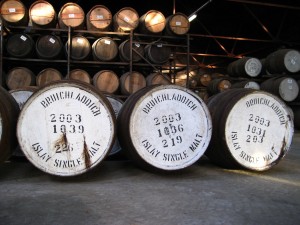For those of you who have never been in a whisky warehouse, let me try to help you visualize. Imagine having a can of Coke in your refrigerator. Now, fill every shelf in your refrigerator with cans of Coke. And while you’re at it, put a few hundred cans in your bedroom. A few thousand in your living room. Another couple of thousand in your garage. A few thousand more in your basement. The phone rings. It’s your friend who says, “Remember that can of Coke I had you store at your place, the one that I wrote my name on? Can you find it for me?”
Casks are stored like needles in a carefully mapped haystack. Warehouses are separated along a distillery site and in some cases are even miles away. The separation is done in part for risk reduction purposes: if some kind of accident befalls one warehouse, there will still be ample whisky stored elsewhere. It’s also done to balance out storage of particular spirits. The whisky in the wood is affected by the external conditions in which its stored. A cask stored close to the floor in a damp warehouse will affect the whisky inside it differently than a cask stored 50 feet high in a dry warehouse.
The risk reduction element means that casks of the same spirit (whether it be the same based on barley used in the mash or the type of wood its aged in) can be separated among those numerous warehouses. So, when the call comes in that an 8-year-old whisky is ready to be vatted and bottled, there is a chance those casks will need to be retrieved from several places. This makes the job of the warehouse crew a bit more challenging. They may have to go to more than one warehouse. They may have to pull some casks from ground level and climb up four stories to reach others.
The most challenging part of cask storage and retrieval at a place like Bruichladdich comes from casks owned by individuals. Bruichladdich and several other distilleries sell private casks to individuals who use them as investments or private bottlings. When one of these individuals calls and wants to taste the progress of the whisky in their cask or have it bottled, it’s up to the warehouse to find and retrieve it. Meticulous records direct the crew to the right cask, but it’s their often intense physical and logistic efforts that end up bringing the cask to the light of day for the first time in years.
The next time you have that “Limited Bottling” of your favorite malt, or you stop into your local liquor store and they have their own label on a single cask offering, know that more than water, grain and yeast went into that spirit. Some complex storage plans and raw physical effort helped bring that whisky to your lips. Raise a toast to the unheralded folks who work this side of the whisky business day-in and day-out.


i don’t suppose you could sneak my stamp onto a cask of scotch…
One of those out of the way, flood-plain casks will work for me…